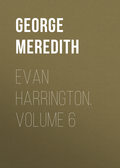
George Meredith
One of Our Conquerors. Volume 5
CHAPTER XLII
THE LAST
In the still dark hour of that April morning, the Rev. Septimus Barmby was roused by Mr. Peridon, with a scribbled message from Victor, which he deciphered by candlelight held close to the sheet of paper, between short inquiries and communications, losing more and more the sense of it as his intelligence became aware of what dread blow had befallen the stricken man. He was bidden come to fulfil his promise instantly. He remembered the bearing of the promise. Mr. Peridon's hurried explanatory narrative made the request terrific, out of tragically lamentable. A semblance of obedience had to be put on, and the act of dressing aided it. Mr. Barmby prayed at heart for guidance further.
The two gentlemen drove Westward, speaking little; they had the dry sob in the throat.
'Miss Radnor?' Mr. Barmby asked.
'She is shattered; she holds up; she would not break down.'
'I can conceive her to possess high courage.'
'She has her friend Mademoiselle de Seilles.'
Mr. Barmby remained humbly silent. Affectionate deep regrets moved him to say: 'A loss irreparable. We have but one voice of sorrow. And how sudden! The dear lady had no suffering, I trust.'
'She fell into the arms of Mr. Durance. She died in his arms. She was unconscious, he says. I left her straining for breath. She said "Victor"; she tried to smile:—I understood I was not to alarm him.'
'And he too late!'
'He was too late, by some minutes.'
'At least I may comfort. Miss Radnor must be a blessing to him.'
'They cannot meet. Her presence excites him.'
That radiant home of all hospitality seemed opening on from darker chambers to the deadly dark. The immorality in the moral situation could not be forgotten by one who was professionally a moralist. But an incorruptible beauty in the woman's character claimed to plead for her memory. Even the rigorous in defence of righteous laws are softened by a sinner's death to hear excuses, and may own a relationship, haply perceive the faint nimbus of the saint. Death among us proves us to be still not so far from the Nature saying at every avenue to the mind: 'Earth makes all sweet.'
Mr. Durance had prophesied a wailful end ever to the carol of Optimists! Yet it is not the black view which is the right view. There is one between: the path adopted by Septimus Barmby:—if he could but induce his brethren to enter on it! The dreadful teaching of circumstances might help to the persuading of a fair young woman, under his direction . . . having her hand disengaged. Mr. Barmby started himself in the dream of his uninterred passion for the maiden: he chased it, seized it, hurled it hence, as a present sacrilege:—constantly, and at the pitch of our highest devotion to serve, are we assailed by the tempter! Is it, that the love of woman is our weakness? For if so, then would a celibate clergy have grant of immunity. But, alas, it is not so with them! We have to deplore the hearing of reports too credible. Again we are pushed to contemplate woman as the mysterious obstruction to the perfect purity of soul. Nor is there a refuge in asceticism. No more devilish nourisher of pride do we find than in pain voluntarily embraced. And strangely, at the time when our hearts are pledged to thoughts upon others, they are led by woman to glance revolving upon ourself, our vile self! Mr. Barmby clutched it by the neck.
Light now, as of a strong memory of day along the street, assisted him to forget himself at the sight of the inanimate houses of this London, all revealed in a quietness not less immobile than tombstones of an unending cemetery, with its last ghost laid. Did men but know it!—The habitual necessity to amass matter for the weekly sermon, set him noting his meditative exclamations, the noble army of platitudes under haloes, of good use to men: justifiably turned over in his mind for their good. He had to think, that this act of the justifying of the act reproached him with a lack of due emotion, in sympathy with agonized friends truly dear. Drawing near the hospitable house, his official and a cordial emotion united, as we see sorrowful crape-wreathed countenances. His heart struck heavily when the house was visible.
Could it be the very house? The look of it belied the tale inside. But that threw a ghostliness on the look.
Some one was pacing up and down. They greeted Dudley Sowerby. His ability to speak was tasked. They gathered, that mademoiselle and 'a Miss Pridden' were sitting with Nesta, and that their services in a crisis had been precious. At such times, one of them reflected, woman has indeed her place: when life's battle waxes red. Her soul must be capable of mounting to the level of the man's, then? It is a lesson!
Dudley said he was waiting for Dr. Themison to come forth. He could not tear himself from sight of the house.
The door opened to Dr. Themison departing, Colney Durance and Simeon Fenellan bare-headed. Colney showed a face with stains of the lashing of tears.
Dr. Themison gave his final counsels. 'Her father must not see her. For him, it may have to be a specialist. We will hope the best. Mr. Dartrey Fenellan stays beside him:—good. As to the ceremony he calls for, a form of it might soothe:—any soothing possible! No music. I will return in a few hours.'
He went on foot.
Mr. Barmby begged advice from Colney and Simeon concerning the message he had received—the ceremony requiring his official presidency. Neither of them replied. They breathed the morning air, they gave out long-drawn sighs of relief, looking on the trees of the park.
A man came along the pavement, working slow legs hurriedly. Simeon ran down to him.
'Humour, as much as you can,' Colney said to Mr. Barmby. 'Let him imagine.'
'Miss Radnor?'
'Not to speak of her.'
'The daughter he so loves?'
Mr. Barmby's tender inquisitiveness was unanswered. Were they inducing him to mollify a madman? But was it possible to associate the idea of madness with Mr. Radnor?
Simeon ran back. 'Jarniman,' he remarked. 'It's over!'
'Now!' Colney's shoulders expressed the comment. 'Well, now, Mr. Barmby, you can do the part desired. Come in. It's morning!' He stared at the sky.
All except Dudley passed in.
Mr. Barmby wanted more advice, his dilemma being acute. It was moderated, though not more than moderated, when he was informed of the death of Mrs. Burman Radnor; an event that occurred, according to Jarniman's report, forty-five minutes after Skepsey had a second time called for information of it at the house in Regent's Park—five hours and a half, as Colney made his calculation, after the death of Nataly. He was urged by some spur of senseless irony to verify the calculation and correct it in the minutes.
Dudley crossed the road. No sign of the awful interior was on any of the windows of the house either to deepen awe or relieve. They were blank as eyeballs of the mindless. He shivered. Death is our common cloak; but Calamity individualizes, to set the unwounded speculating whether indeed a stricken man, who has become the cause of woeful trouble, may not be pointing a moral. Pacing on the Park side of the house, he saw Skepsey drive up and leap out with a gentleman, Mr. Radnor's lawyer. Could it be, that there was no Will written? Could a Will be executed now? The moral was more forcibly suggested. Dudley beheld this Mr. Victor Radnor successful up all the main steps, persuasive, popular, brightest of the elect of Fortune, felled to the ground within an hour, he and all his house! And if at once to pass beneath the ground, the blow would have seemed merciful for him. Or if, instead of chattering a mixture of the rational and the monstrous, he had been heard to rave like the utterly distraught. Recollection of some of the things he shouted, was an anguish: A notion came into the poor man, that he was the dead one of the two, and he cried out: 'Cremation? No, Colney's right, it robs us of our last laugh. I lie as I fall.' He 'had a confession for his Nataly, for her only, for no one else.' He had 'an Idea.' His begging of Dudley to listen without any punctilio (putting a vulgar oath before it), was the sole piece of unreasonableness in the explanation of the idea: and that was not much wilder than the stuff Dudley had read from reports of Radical speeches. He told Dudley he thought him too young to be 'best man to a widower about to be married,' and that Barmby was 'coming all haste to do the business, because of no time to spare.'
Dudley knew but the half, and he did not envy Dartrey Fenellan his task of watching over the wreck of a splendid intelligence, humouring and restraining. According to the rumours, Mr. Radnor had not shown the symptoms before the appearance of his daughter. For awhile he hung, and then fell, like an icicle. Nesta came with a cry for her father. He rose: Dartrey was by. Hugged fast in iron muscles, the unhappy creature raved of his being a caged lion. These things Dudley had heard in the house.
There are scenes of life proper to the grave-cloth.
Nataly's dead body was her advocate with her family, with friends, with the world. Victor had more need of a covering shroud to keep calamity respected. Earth makes all sweet: and we, when the privilege is granted us, do well to treat the terribly stricken as if they had entered to the bosom of earth.
That night's infinite sadness was concentrated upon Nesta. She had need of her strength of mind and body.
The night went past as a year. The year followed it as a refreshing night. Slowly lifting her from our abysses, it was a good angel to the girl. Permission could not be given for her to see her father. She had a home in the modest home of Louise de Seilles on the borders of Dauphins; and with French hearts at their best in winningness around her, she learned again, as an art, the natural act of breathing calmly; she had by degrees a longing for the snow-heights. When her imagination could perch on them with love and pride, she began to recover the throb for a part in human action. It set her nature flowing to the mate she had chosen, who was her counsellor, her supporter, and her sword. She had awakened to new life, not to sink back upon a breast of love, though thoughts of the lover were as blows upon strung musical chords of her bosom. Her union with Dartrey was for the having an ally and the being an ally, in resolute vision of strife ahead, through the veiled dreams that bear the blush. This was behind a maidenly demureness. Are not young women hypocrites? Who shall fathom their guile! A girl with a pretty smile, a gentle manner, a liking for wild flowers up on the rocks; and graceful with resemblances to the swelling proportions of garden- fruits approved in young women by the connoisseur eye of man; distinctly designed to embrace the state of marriage, that she might (a girl of singularly lucid and receptive eyes) the better give battle to men touching matters which they howl at an eccentric matron for naming. So it was. And the yielding of her hand to Dartrey, would have appeared at that period of her revival, as among the baser compliances of the fleshly, if she had not seen in him, whom she owned for leader, her fellow soldier, warrior friend, hero, of her own heart's mould, but a greater.
She was on Como, at the villa of the Signora Giulia Sanfredini, when Dudley's letter reached her, with the supplicating offer of the share of his earldom. An English home meanwhile was proposed to her at the house of his mother the Countess. He knew that he did not write to a brilliant heiress. The generosity she had always felt that he possessed, he thus proved in figures. They are convincing and not melting. But she was moved to tears by his goodness in visiting her father, as well as by the hopeful news he sent. He wrote delicately, withholding the title of her father's place of abode. There were expectations of her father's perfect recovery; the signs were auspicious; he appeared to be restored to the 'likeness to himself' in the instances Dudley furnished:—his appointment with him for the flute-duet next day; and particularly his enthusiastic satisfaction with the largeness and easy excellent service of the residence 'in which he so happily found himself established.' He held it to be, 'on the whole, superior to Lakelands.' The smile and the tear rolled together in Nesta reading these words. And her father spoke repeatedly of longing to embrace his Fredi, of the joy her last letter had given him, of his intention to send an immediate answer: and he showed Dudley a pile of manuscript ready for the post. He talked of public affairs, was humorous over any extravagance or eccentricity in the views he took; notably when he alluded to his envy of little Skepsey. He said he really did envy; and his daughter believed it and saw fair prospects in it.
Her grateful reply to the young earl conveyed all that was perforce ungentle, in the signature of the name of Nesta Victoria Fenellan:– a name he was to hear cited among the cushioned conservatives, and plead for as he best could under a pressure of disapprobation, and compelled esteem, and regrets.
The day following the report of her father's wish to see her, she and her husband started for England. On that day, Victor breathed his last. Dudley had seen the not hopeful but an ominous illumination of the stricken man; for whom came the peace his Nataly had in earth. Often did Nesta conjure up to vision the palpitating form of the beloved mother with her hand at her mortal wound in secret through long years of the wearing of the mask to keep her mate inspirited. Her gathered knowledge of things and her ruthless penetrativeness made it sometimes hard for her to be tolerant of a world, whose tolerance of the infinitely evil stamped blotches on its face and shrieked in stains across the skin beneath its gallant garb. That was only when she thought of it as the world condemning her mother. She had a husband able and ready, in return for corrections of his demon temper, to trim an ardent young woman's fanatical overflow of the sisterly sentiments; scholarly friends, too, for such restrainings from excess as the mind obtains in a lamp of History exhibiting man's original sprouts to growth and fitful continuation of them. Her first experience of the grief that is in pleasure, for those who have passed a season, was when the old Concert- set assembled round her. When she heard from the mouth of a living woman, that she had saved her from going under the world's waggon-wheels, and taught her to know what is actually meant by the good living of a shapely life, Nesta had the taste of a harvest happiness richer than her recollection of the bride's, though never was bride in fuller flower to her lord than she who brought the dower of an equal valiancy to Dartrey Fenellan. You are aware of the reasons, the many, why a courageous young woman requires of high heaven, far more than the commendably timid, a doughty husband. She had him; otherwise would that puzzled old world, which beheld her step out of the ranks to challenge it, and could not blast her personal reputation, have commissioned a paw to maul her character, perhaps instructing the gossips to murmur of her parentage. Nesta Victoria Fenellan had the husband who would have the world respectful to any brave woman. This one was his wife.
Daniel Skepsey rejoices in service to his new master, owing to the scientific opinion he can at any moment of the day apply for, as to the military defences of the country; instead of our attempting to arrest the enemy by vociferations of persistent prayer:—the sole point of difference between him and his Matilda; and it might have been fatal but that Nesta's intervention was persuasive. The two members of the Army first in the field to enrol and give rank according to the merits of either, to both sexes, were made one. Colney Durance (practically cynical when not fancifully, men said) stood by Skepsey at the altar. His published exercises in Satire produce a flush of the article in the Reviews of his books. Meat and wine in turn fence the Hymen beckoning Priscilla and Mr. Pempton. The forms of Religion more than the Channel's division of races keep Louise de Seilles and Mr. Peridon asunder: and in the uniting of them Colney is interested, because it would have so pleased the woman of the loyal heart no longer beating. He let Victor's end be his expiation and did not phrase blame of him. He considered the shallowness of the abstract Optimist exposed enough in Victor's history. He was reconciled to it when, looking on their child, he discerned, that for a cancelling of the errors chargeable to them, the father and mother had kept faith with Nature.






